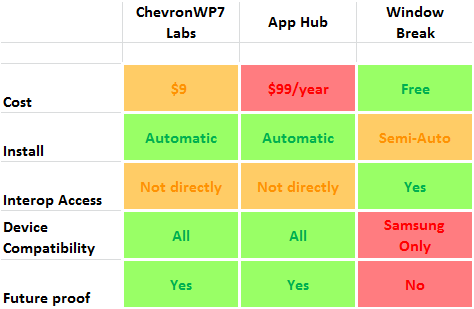Want to dev-unlock your Windows Phone? Here are your options.

All the latest news, reviews, and guides for Windows and Xbox diehards.
You are now subscribed
Your newsletter sign-up was successful
So you got a Windows Phone for Christmas? Sweet. If you're a developer, you're probably itching to start writing code for the device. If an advanced hobbyist, homebrew software may be more of your interest. While the emulator -- a part of the Windows Phone SDK -- rocks for testing locally, you'll eventually want to try the real deal by loading up XAPs on your phone. We'll cover the pros and cons of each approach to do so.
Microsoft App Hub
The App Hub is evolution of what was previously called the XNA Creators Club, offering a hub for both Xbox Live and Windows Phone development. With the purchase of a subscription costing $99 USD per year, you'll gain access to human technical support and more importantly access to the Marketplace where you can sell your shiny wares. If you can afford it or know you have the next killer app (to cover the yearly dues) -- we say go for it. Our friends outside Marketplace Launch areas, like those in the Middle East, will have access to App Hub via a proxy participating in the Microsoft Global Publisher Program. (Yalla Apps is a great example.) It's also worth noting students, via the Dreamspark initiative, can get that fee waived if eligible. (A steal!)
- Pros: Original Microsoft solution, Marketplace publish access, technical support. Can unlock 3 devices.
- Cons: It's expensive ($99 USD/yr). Can vary if using a GPP proxy.
But some developers can't or won't make that commitment. They may want to practice their C# skills or play with some crazy experimental code from a neighbor. In any case, there are try-before-you-buy-App-Hub options at your disposal:
Jaxbot's WindowBreak
Using XDA Developers' Heathcliff74's original package as a start, another XDA Developers member, Jaxbot, made some tweaks to simplify the deployment mechanism. Rather than deploy the package using a PC (i.e. sideload), requiring an already unlocked device, his solution involves visiting a specially crafted webpage. That ease of use, however, comes at a price -- limiting compatibility to only Samsung devices at the moment. (He's working on this and soon expects it to be as compatible as Heathcliff74's original offering.)
- Pros: Free, offers coveted "interop access", easy to install
- Cons: Only (currently) works on Samsung phones, will break if Microsoft patches hole
ChevronWP7 Labs
The ChevronWP7 Labs experiment -- deriving its name from the already missed Stargate franchise -- was put together by Rafael Rivera, Chris Walsh, and Long Zheng, and is an evolution of the original ChevronWP7 unlocker. The team was given a rare opportunity by Microsoft to offer a cheaper, not free, solution by decoupling the phone unlocking mechanism from App Hub. (That means no Marketplace publishing.) For $9 USD, 'Labs will (legimitately) unlock any Windows Phone you have for the life of that device. No Microsoft vs. hacker cat and mouse game participiation required. The downside is that you don't get that coveted "interop access" the other solutions provide. But you could, of course, combine this unlock method with perhaps another. Cough.
- Pros: Vetted by Microsoft, easy to use, compatible with all devices, future proof
- Cons: Not free ($9 USD), no "interop access" out of the box
As you can see, there are quite a few options for developer unlocking your Windows Phone. Each has their pros and cons and which one is "best" depends on your short and long-term goals. Tinker tots not unfamiliar with flashing their devices and working out issues will be happy with the free offerings. Those looking for less trouble and a longer-term solution would probably be better suited with ChevronWP7 Labs or a full blown App Hub subscription. Regardless, when you get that awesome app written let us know.
Full discosure: I work with 'Walsh, and 'Zheng on the ChevronWP7 Labs experiment. This guide was designed to simply lay out the facts in a digestible format. I have no intention to mislead the public for financial gain of any kind. The comparison chart's columns are sorted by consumer usefulness (green).
All the latest news, reviews, and guides for Windows and Xbox diehards.
Revision note: Heathcliff's XAP was removed from the guide. I forgot it required a developer unlocked device, hence the development of WindowBreak. Sorry about that! Too much 'nog. (Thanks @Jaxbot!)

Rafael is a Former Contributor for Windows Central.
